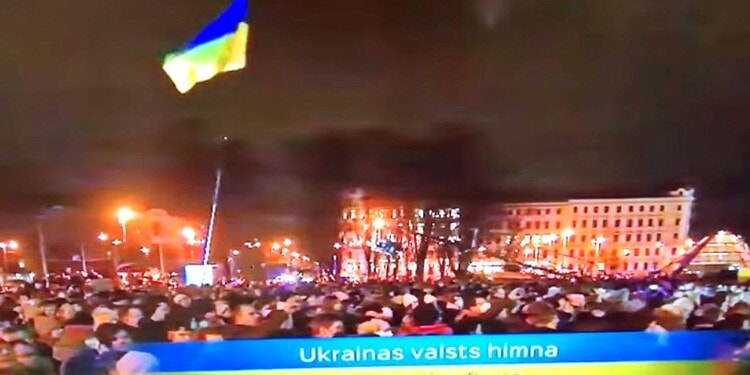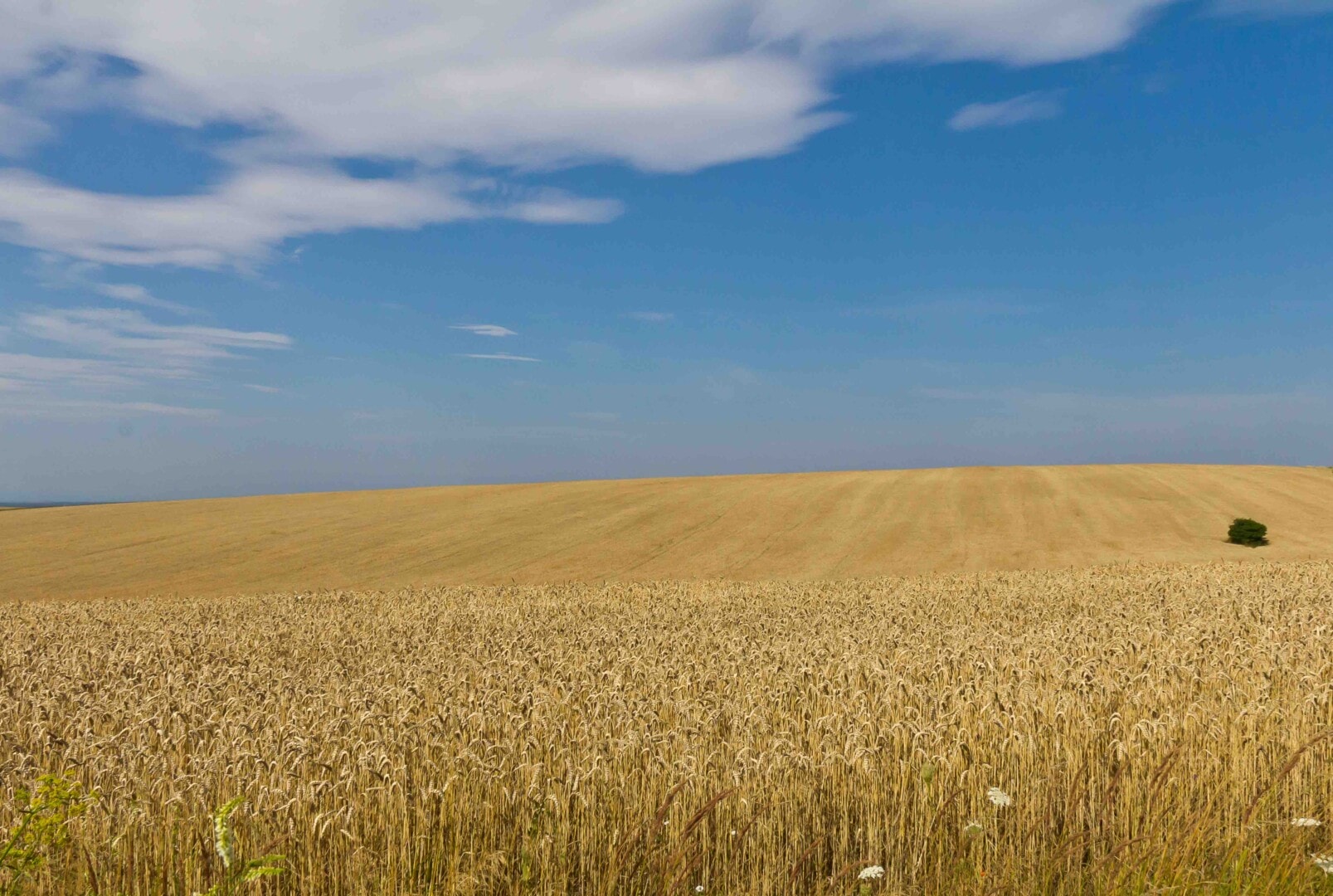Music engages in many ways, at ceremonies such as marriages, joyous births, saddened with the passing of a loved one, religious rituals, and services, dances, or in simply providing pleasure in listening to beauty. It takes on special potency, however, when we feel threatened in or by war. Or, when seeking to topple a dictator or find unity in resisting the imposition of a tyrant.
In these latter instances music is more than a complementary aspect, but core inspiration, a fundamental part of the human condition.
That this is so today and, in the past, in different countries and circumstances is indisputable. The instances to illustrate this point would fill volumes. Here I will only attempt to touch the surface of this immense treasure.
The Most Immediate: War in Ukraine
For the Ukrainians, the singing of the national anthem, the concerts by the Ukrainian orchestras and opera companies have shown the world an inspired people with the courage to stand against the terrifying onslaught by the Russians.
Their anthem was adopted in 1992 after the fall of the Soviet Union and has been their rallying cry, now thirty years later. The first stanza is “Ukraine’s freedom has not yet perished, nor has her glory.” And it has now become a global anti-war protest, for example, the Latvian crowds sing the Ukraine anthem in front of the Russian embassy in the capital Riga three weeks ago, at the start of the invasion:
As the Russian army continues to invade and rain bombs on the cities killing civilians – 112 children died so far, says President Zelensky – many artists in Ukraine are trying to find hope, redemption — and boost their country’s spirits. Here is a collection put together by NPR, click here to listen.
As to Russia, there too are brave individuals, some who could no longer tell the truth. The last vestige of a free voice and objective news ended this past week when the Rain station staff resigned en masse and the station ended its broadcasting with Tchaikovsky’s “Swan Lake”, the same ballet and music played in August 1991 during an attempted coup that signaled the beginning of the end of the Soviet Union. And Rain, as it left, aired the now prohibited words “no to war”.
The Entire staff of the Russian TV channel “the rain” resigned during a live stream with last words: “no war” and then played “swan lake” ballet video (just like they did on all USSR tv channels when it suddenly collapsed)#UkraineRussianWar #Ukraine #UkraineWar #Putin #Russia pic.twitter.com/NAkWlghe0r
— Chilly Chills (@WeeliyumF) March 3, 2022
Ukrainian refugee spirits were lifted by music. Arriving at the Polish border they were serenaded by ‘Piano Man’ Davide Martello, a German of Italian descent who traveled from Germany with his instrument on wheels to bring some musical joy to the refugees.
He was joined at the keyboard by a Ukrainian woman, who played ‘We Are the Champions’ by the British rock band Queen. Speaking a few words in English and making gestures, the woman suggested she had crossed from Ukraine and had not slept for three days.
Another European Civil War 30 Years Ago
A prolonged blockade of Sarajevo, the capital of Bosnia and Herzegovina, took place during the bloody Bosnian War, under siege from 1992 to 1996.
At the time, Vedran Smajlovic famously played Adagio in G Minor for 22 days in 1992 sitting on a pile of rubble to mark the death of the 22 people killed in the street in a mortar attack while queuing for bread. Smajlovic was once the principal cello of the Sarajevo Symphony Orchestra. “The Cellist of Sarajevo” is a fictional work based on this true story.
The World Wars: Inspired Music
Music inspired patriotism and resolve in both World Wars. A sampling of the various ways it affected the combatants, resistance movements, and ordinary citizens is set forth below.
- United States
God Bless America: It was written for a World War I wartime musical revue but revised and used in World War II. The blue link takes you to an extraordinary rending by Kate Smith – from the Army 1943 HD.
Another World War II piece is Aaron Copland’s “Fanfare for the Common Man” which continues to be played at commemorative events:
This song was originally going to be called “fanfare for the soldier” or “fanfare for the sailor” but after being inspired by the vice president’s speech in which he said something along the lines of “the century of the common man”, the composer named it “fanfare for the common man”. And, as one commented on Youtube, “then there was light. Truly an inspiring song for all of the men and women who fight/fought for the free people of the world.”
- United Kingdom
We’ll Meet Again: It was one of the most famous of World War II, written in 1939 lyrics to touch soldiers going off to battle, their families, sweethearts, and loved ones. Its famous lines ring true in almost every past, present and future conflict:
“We’ll meet again, Don’t know where; Don’t know when; But I know we’ll meet again some sunny day”
- France
The Marseillaise: Named the ‘Chant de Guerre pour l’Armée du Rhin’ (War Song for the Rhine Army), it became ‘La Marseillaise’ when sung on the streets of Paris by volunteers from Marseille, who had marched to the capital.
In 1795 became the rallying cry of the French Revolution as the National Anthem in 1795. And so, it is now. Here is Mireille Mathieu’s legendary rendering with the Eiffel tower in the background:
- Russian Federation (former Soviet Union)
L’ Internationale: It was the anthem of the First, Second, and Third Internationals organized by communists, and, from 1918 to 1944, the national anthem of the Soviet Union.
Written in 1871 as a poem, it begins, “Debout, les damnés de la terre” (“Arise, the wretched of the earth”) and acclaim, “Nous n’étions rien — donc, soyons tout!” (“We were nothing—thus let us be everything!”).
- People’s Republic of China (PRC)
March of the Volunteers: Originally titled the “March of the Anti-Manchukuo Counter-Japan Volunteers it was adopted as the People’s Republic of China (PRC)s provisional anthem in 1949 in place of the “Three Principles of the People” of the Republic of China (1912–1949).
The piece was first written for a communist film, Children of Troubled Times (1935), and became a famous military song during the Second Sino-Japanese War. Here is an excerpt of that film that ends with the March:
Africa, Middle East, and the Mediterranean
Over the last three-quarters of a century, this region has been in turmoil, for different and multiple reasons, whether to provide safe haven, opportunity, and/or to overthrow long-entrenched dictators.
No doubt one of the main events in recent years has been the Arab Spring that began in 2010 and led to a series of protests and massive revolts across North Africa and the Middle East. First in Tunisia, then followed shortly behind with protests in Egypt, Syria, Libya, Yemen, and other countries in the Arab World.
Songs of change accompanied the Arab Spring and became ubiquitous across the region.
Whatever the cause in each case, music continues to play a critical role in galvanizing people, and here we take a brief look at some of the countries involved (not all, for lack of space, not a lack of interest).
- Tunisia:
Emel Mathlouthi has been called “The Voice of the Tunisian Revolution.”
A video of one of her songs “Kelmti Horra” – “My Word is Free” – went viral and became the anthem for protesters during the December 2010 uprising, forcing then-President Ben Ali to flee the country.
- Egypt:
Ramy Essam stood in the middle of Tahrir Square (Martyr Square) with an acoustic guitar and a microphone and sang “Leave”, a song that called for the resignation of President Mubarak. The 23 January 2011 Revolution led on February 11, 2011, to the announcement of the then President General Mubarak, who had been in office since 1981
These are two instances in the region where the people took to the streets to overturn a dictatorial regime. As the Bangkok Post succinctly put it, “Few of the pro-democracy protesters who took the Middle East by storm a decade ago had a flag to raise or a leader to follow. But all of them had a song to sing.”
Elsewhere in the region, music was and remains paramount in its role as the people’s muse. Here are just a few more examples.
- Israel
The desire for a safe place to go in the face of the Holocaust and widespread worldwide antisemitism, a Jewish State was created and recognized by the United Nations in 1947. This was the culmination of an effort that had begun in the prior century.
Hatikvah: It began as a Hebrew poem entitled “Tikvatenu” (“Our Hope”) and was sung in 1897 at the First Zionist Congress as the de facto national hymn. In 2004 the Israeli government designated it as the national anthem.
- South Africa
This Land Is Mine: Songs united people in the struggle for a South Africa free of apartheid.
Composed in the 1950s in conjunction with the South African Liberation Movement, the songs express the aspirations and the fighting spirit of South Africa’s freedom fighters.
- Turkey
Independence March (İstiklâl Marşı): Adopted officially in March 1921 which was two-and-a-half years before the October 1923 establishment of the Republic of Turkey.
The lyrics and music provided motivation for troops fighting in the Turkish War of Independence, defending home and hearth, recognizing their sacrifices as well as to Turkish commitment to defend the nation for freedom, faith, and sacrifice in the pursuit of liberty. It remains the national anthem today.
The COVID war
Since 2020 people virtually everywhere have had to take arms against an insidious enemy, the COVID-19 virus, and thankfully now are increasingly taking vaccine shots in their arms.
This is a very different instance in which human resilience has looked to music to help live through the worse. Songs have been written, concerts and performances have been organized by institutions and governments.
But what is even more powerful are spontaneous music events by common folk and communities to lift spirits.
One such wonderful example is in Italy where millions sang together from balconies in an effort to keep up the country’s morale. Confined to their homes, neighbors joined together to sing “Canto della Verbena (“And While Siena Sleeps”), a traditional folk song of Siena. A powerful moment of music there and elsewhere as well.
Music cannot be eliminated by fiat
Through millennia, from the very earliest time to today, humans seek one or other form of music. It is essential to the human spirit.
Words can be misunderstood and/or censored, maybe songs can for a time, but not melodies. Autocrats and tyrants never seem to learn this basic truth.
Editor’s Note: The opinions expressed here by Impakter.com columnists are their own, not those of Impakter.com. — In the Featured Photo: Screenshot from the video of Latvians singing the Ukrainian hymn at the start of the war.









